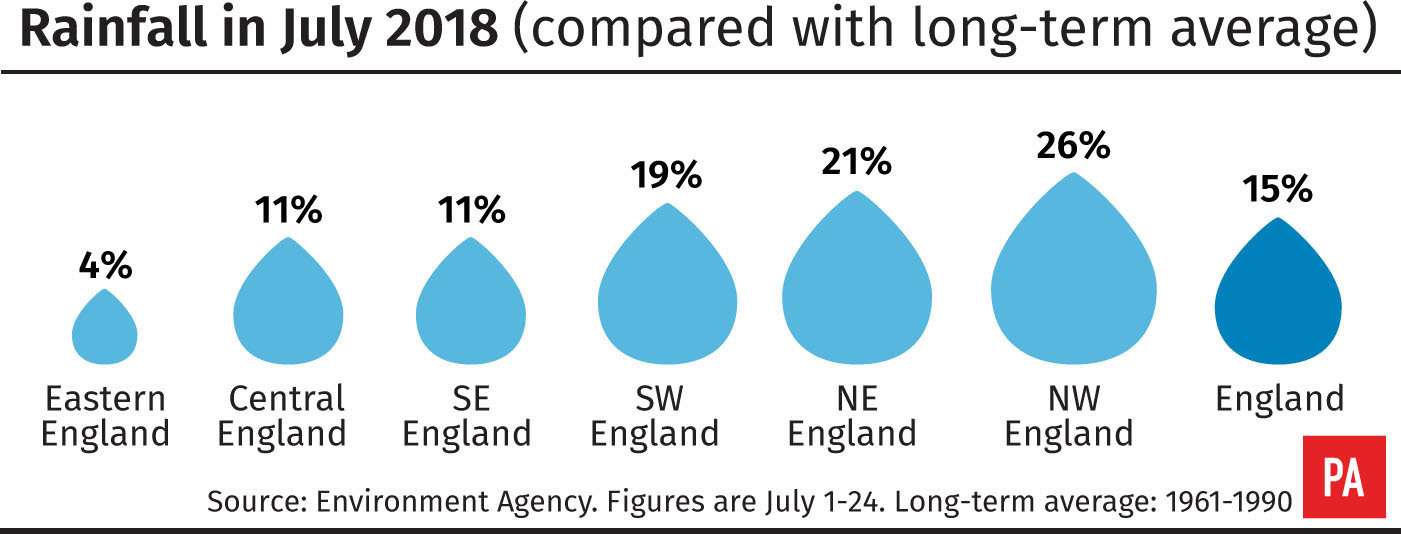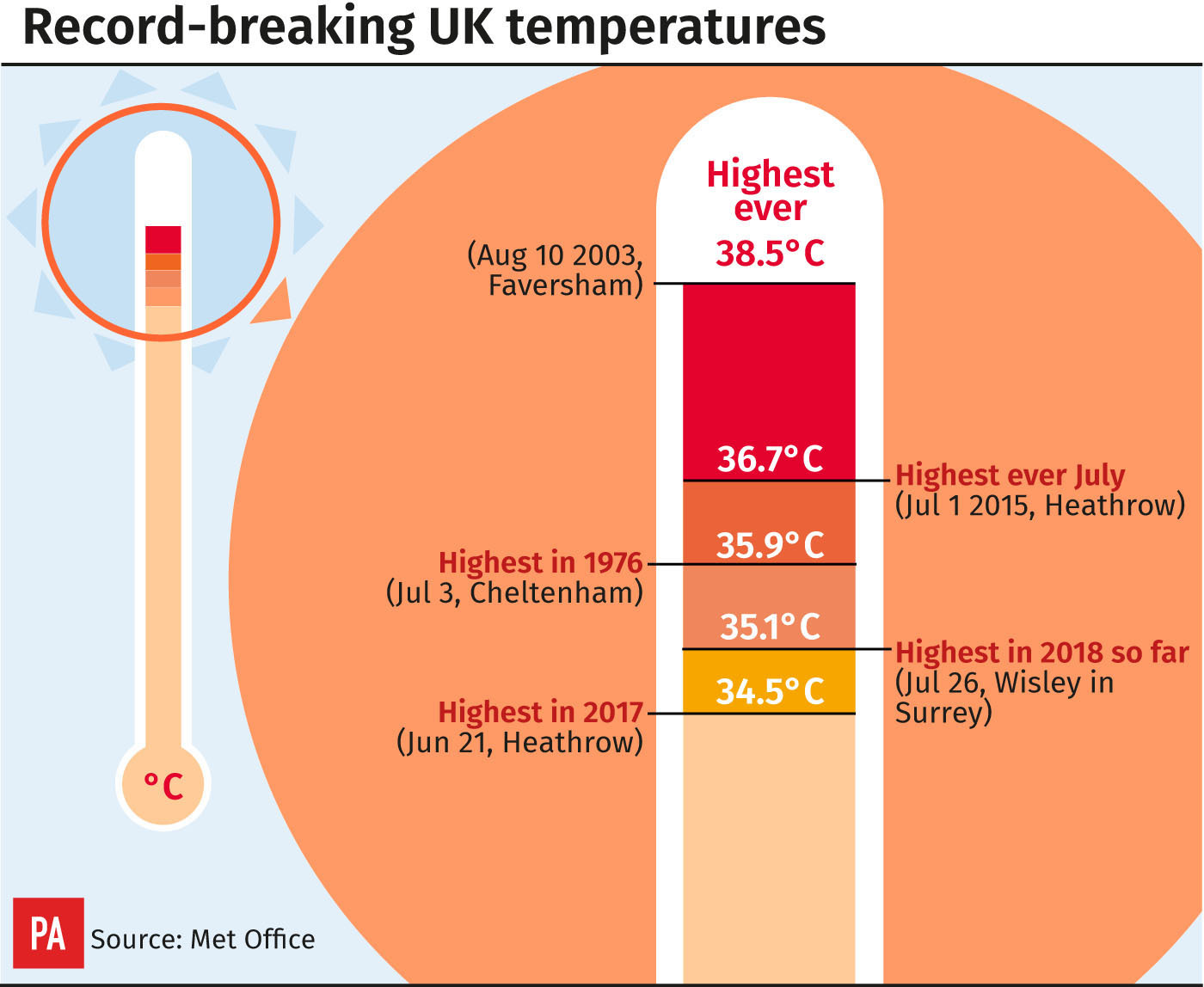
Heavy thunderstorms on Friday marked the end of the UK heatwave, with the Met Office issuing weather warnings.
The torrential rain came with alerts the storms could cause danger to life, sudden flooding and power cuts.
Thursday saw the highest temperature recorded in the UK since 2015, with the mercury in Faversham hitting 35.3C (95.5F).
While forecasts earlier in the week suggested Friday could see the record for the hottest July day broken, the hottest it got was 34.7C at Tibenham Airfield in Norfolk.
An amber severe weather warning for #thunderstorms has been updated: https://t.co/QwDLMfRBfs. Stay #weatheraware @metofficeuk pic.twitter.com/YdMOJ5OwEH
— Met Office (@metoffice) July 27, 2018
Yellow warnings are in place for most of England into the early hours of Saturday, and in north-east Scotland until 2pm.
Torrential downpours were forecast, with as much as 30mm of rainfall in one hour and 60mm in three hours, while large hail, frequent lightning and strong, gusty winds will be additional hazards.
While some will have welcomed the rain and the cooler temperatures, those keen to catch a glimpse of the blood moon, the longest lunar eclipse of the 21st century, will have been disappointed.
The cloud cover meant the rare celestial event was not visible to many in Hampshire and Wiltshire in the south and south west, to Hull in east Yorkshire, Liverpool in the north west and Dublin in Ireland.
— Met Office (@metoffice) July 27, 2018
Yellow warnings for rain have also been issued for Northern Ireland on Saturday, with thunder possible.
Singer Sir Tom Jones was forced to cancel a concert due to the wet weather.
York Racecourse tweeted that the show had been called off because of the “thunder and lightning storms”.
York Racecourse apologises to customers after thunder and lightning storms forced the cancellation of the Tom Jones Concert at York racecourse on Friday evening.https://t.co/HhD65qzbaY pic.twitter.com/HTjsn9MSiL
— York Racecourse (@yorkracecourse) July 27, 2018
Will Lang, chief meteorologist at the Met Office, said conditions would change over the weekend.
He said: “While Saturday will be a pleasant, but breezy day in many places, we are in for a change on Sunday with a wet and windy day in stark contrast to what has been typical recently.
“We have already issued a Met Office weather warning for the impacts of wind and rain in south-west England and south Wales.
“Southerly winds will gust at around 35-40 mph and up to 50mph for exposed coasts and hills.
“Rain will be most persistent over hills and parts of the Brecon Beacons and Dartmoor could see as much as 60-80mm of rain.”
Tony Wafer, RNLI community safety manager, said: “If you are heading to the coast this weekend, please find out where your nearest lifeguarded beach is and ask the lifeguards for advice on conditions, especially if you are going in the water.
“RNLI lifeboats and lifeguards have had four times as many rescues of inflatables so far this summer than they did last year.”

Meanwhile, police forces have been called following concerns for people’s welfare at rivers and a lake.
Thames Valley Police said a man’s body was recovered from the Jubilee River in Slough, adding that his death is not being treated as suspicious.
Warwickshire Police said emergency services personnel searching for a 17-year-old boy who disappeared after getting into difficulty in a quarry lake in Bishops Itchington, near Leamington Spa, have recovered a body.
We are sad report police searching the Blue Lagoon quarry area of Bishop's Itchington have recovered a body. Please see below for the latest update from Inspector Rupert Atkinson: https://t.co/5NabayFb0k pic.twitter.com/rxztEDSq6b
— Warwickshire Police (@warkspolice) July 27, 2018
Essex Police said a body was found on Saturday in the search for a boy who was last seen in the sea near Clacton Pier two days earlier.
The force was called on Thursday amid concerns for the welfare of two teenagers and was on the scene just after 6.35pm.
One boy was rescued by a lifeboat crew, and police said the body of a 15-year-old – provisionally named as Ben Quartermaine – was recovered shortly before 8am on Saturday.
Bedfordshire are also looking for a man who got into difficulties in the river Great Ouse on Friday afternoon.
Elsewhere, cross-Channel rail operator Eurotunnel cancelled thousands of tickets after “extreme temperatures” caused major disruption to services.
On UK trains, passengers were urged to avoid travelling on London North Eastern Railway (LNER) on Friday after lightning damaged the signalling system.
Train firm Northern advised passengers not to travel in the Yorkshire area due to the same issue.

On the roads, motorists were warned of lightning, flash flooding and large hailstones.
A mix of toxic air, extreme highs, emissions from the continent and a lack of cloud cover caused a “high” air pollution alert to be issued for London.
Elsewhere, authorities said the heatwave was causing “winter conditions” in parts of the NHS, while many nurses were said to be dizzy and exhausted.


Comments: Our rules
We want our comments to be a lively and valuable part of our community - a place where readers can debate and engage with the most important local issues. The ability to comment on our stories is a privilege, not a right, however, and that privilege may be withdrawn if it is abused or misused.
Please report any comments that break our rules.
Read the rules hereLast Updated:
Report this comment Cancel